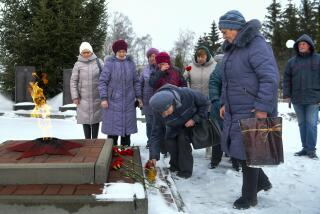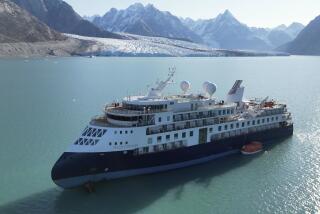Russian investigators say they found drugs on Greenpeace ship
- Share via
MOSCOW -- Russian investigators said Wednesday that they found drugs and equipment that could be used for spying on board a Greenpeace ship used in a foiled protest against offshore oil and gas drilling in the Arctic.
Additional charges are expected to be filed against 30 people accused of piracy for their roles in last month’s protest, according to a statement posted on the website of Russia’s Investigative Committee.
Committee spokesman Vladimir Markin said “narcotic substances” -- apparently morphine and poppy straw, which is used to manufacture opiates such as heroin – were found on the ship along with “dual purpose” equipment that “could be use not only for ecological ends.”
Investigators are also trying to determine which of those in custody were allegedly responsible for ramming coast guard ships during a failed attempt to board an oil drilling platform, Markin said. He said the suspects’ actions “endangered the life and health” of those on board.
Greenpeace has said that its activists tried to hang a banner from the Prirazlomnaya platform in the Barents Sea on Sept. 18, but were driven away by the Russian coast guard. Prirazlomnaya is a major exploration project of Gazprom Neft, a subsidiary of the Russian state-owned energy giant Gazprom.
The next day, Russian commandos stormed the Arctic Sunrise, a Greenpeace icebreaker, and arrested an international crew of 28 activists and two freelance journalists.
A court in the northern Russian port city of Murmansk ordered the detainees held for two months, pending an investigation. If convicted of the piracy charges, they could face up to 15 years in prison and fines of up to $15,000.
Vladimir Chuprov, head of Greenpeace Arctic Program, called the Russian accusations absurd.
“The investigation is certainly in a crisis if they make such absurd statements about drugs onboard,” Chuprov told the Los Angeles Times. “Even a Russian court won’t accept this ridiculous theory that the crew of the Arctic Sunrise consisted of drug addicts armed with spy equipment and bent on capturing a Russian oil platform.”
He noted that the ship has been under the control of Russian investigators since the activists and crew were taken to prison Sept. 24.
“They could have found anything they wanted on board our boat, with all this time on their hands,” Chuprov said. “Thank God they haven’t found firearms.”
Chuprov said his group is counting on President Vladimir Putin to intervene. Putin has said that it is “quite obvious” that the Greenpeace activists were not pirates, but he defended the seizure of their ship after they tried to raid the platform.
In a letter delivered Wednesday to the Russian Embassy in The Hague, Greenpeace Executive Director Kumi Naidoo offered to move to Russia and act as a guarantor of the good conduct of the detainees, were they to be released on bail.
“They, we, Greenpeace, do not believe ourselves to be above the law,” Naidoo said in the letter. “We are willing to face the consequences of what we did, as long as those consequences are within a nation’s criminal code as any reasonable person understands that code to be.”
ALSO:
Romanian law ordering death for stray dogs stirs protest worldwide
Ousted Egyptian President Mohamed Morsi to stand trial next month
Syria releases video of purported chemical weapons inspectors at work
Staff writer Alexandra Zavis in Los Angeles contributed to this report.
More to Read
Sign up for Essential California
The most important California stories and recommendations in your inbox every morning.
You may occasionally receive promotional content from the Los Angeles Times.










